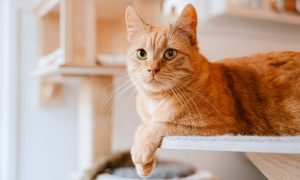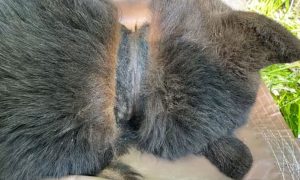Whether it’s a smiling, tail-wagging dog bursting with contagious happiness or a cat pulsing with purrs in someone’s lap, animals soothe us, amuse us, and bring us joy.
The symbiotic human-animal bond also has a host of health benefits. Having a pet lowers cholesterol and blood pressure, decreases stress and the occurrence of heart attacks, and alleviates depression. Purr vibrations are 20-140 Hz, and can reportedly promote bone growth and healing, pain relief, swelling reduction, wound healing, muscle growth and repair, tendon repair, joint mobility, and dyspnea (shortness of breath) relief. Kitties can stimulate memory in Alzheimer patients; people on the autism spectrum also respond to cats. For example, children who don’t speak much will talk when relaxed in the company of a feline.
Health experts have taken notice of all of this, and many programs now utilize the positive effects of cats on the elderly. LiFeline in Rochester, New York, has one such program called Pet Assisted Therapy Extended Stay. They place older (and some younger) cats in nursing homes, hospice, and residential care settings. LiFeline lends the cats to the facilities, and the kitties remain up for adoption. Some residents are unable to afford a pet or may have had to re-home their companion animal when they moved into a facility. Faces light up when they see the kitties because the animals are pure, portable joy.
Rescue group Ohio Alleycat Resource has a similar initiative called Pet Adoptions for Loving Seniors (PALS). The cats are normally about seven years old or older. Residents love the kitty visits, and talk about their past pets. They also request photos taken of themselves with the felines so they can send the pictures to their children and grandchildren. The cats enjoy the cuddling as much as the people.
Hearts that Purr in Tucson, Arizona has taken cat therapy to the next level by pairing residents with their own feline. They rescue senior cats whose owners have passed away or are unable to take care of them, and pay the expenses for the kitties to live with nursing home residents. The seniors find a sense of purpose while caring for the feline in this tremendously successful program.
Pairing up two populations that make each other happy is a beautiful thing. As old-fashioned as it may seem, cat therapy just may be the future of senior health care.






